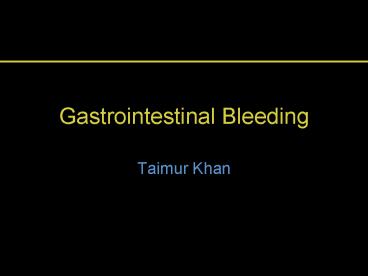Gastrointestinal Bleeding - PowerPoint PPT Presentation
1 / 10
Title:
Gastrointestinal Bleeding
Description:
Acute infectious colitis. Vasculitic ischemia. Solitary rectal ulcer. NSAID-induced ulcers ... diverticular bleeding or for ischemic colitis and cancers. ... – PowerPoint PPT presentation
Number of Views:113
Avg rating:3.0/5.0
Title: Gastrointestinal Bleeding
1
Gastrointestinal Bleeding
- Taimur Khan
2
GI Bleed
- Upper GI Bleed
- Above the ligament of Treitz
- Common presentation hematemesis or melena
- Melena develops after 50-100 ml of blood loss in
the upper GI tract - Lower GI Bleed
- Below the ligament of Treitz
- Hematochezia can be the presentation but can also
be present in 10 of upper GI bleed cases
3
Upper GI Bleed
- Etiology of Rare Causes
- Aortoenteric Fistulas 2 of Abdominal Aortic
Grafts - Hemobilia (from hepatic tumors, angioma
penetrating trauma - Pancreatic Malignancy
- Pseudoaneurysm (hemosuccus pancreatitis)
- Dieulafoys Lesion (aberrant gastric sub-mucosal
artery)
- Etiology Common Causes
- Peptic Ulcer Disease
- Portal Hypertension leading to variceal bleeding
- Mallory-Weiss Tears
- Vascular Anomalies
- Gastric Neoplasms
- Erosive Gastritis
- Erosive Esophagitis
4
Management of Upper GI Bleed
- ABC always first and assess airway and breathing
first - For circulation assess blood pressure and pulse
rate - SBP lt 100 mmHg and pulse gt100 beats/min
identifies high risk patients - Postural hypotension and tachycardia may be
present but other reasons also need assessment
5
Management of Upper GI Bleed
- Two large bore at least 18 gauge needles placed
and Intravenous (IV) fluids should be started - CVP monitoring may be important in some cases but
should not hinder the fluid resuscitation with IV
fluids
- Lab Tests To Send
- CBC
- Chemistry panel and Creatinine
- PT/INR
- Liver Enzymes and Serologies if status not known
- Type and cross match
- Lactic acid whole blood
6
Management of Upper GI Bleed
- Transfusion parameters keep Hematocrit between
25-30, in absence of continued bleeding,
hematocrit should rise 3 with each transfusion. - Platelet transfusion for count below 50000/ µL,
or platelet dysfunction due to aspirin regardless
of counts - Uremic Patient with platelet dysfunction with
active bleeding are given three doses of DDAPV
0.3 µgrams/kg IV at 12 hour intervals - FFP for INR gt 1.5
- In cases of Massive GI bleeding, 1 unit of FFP
for every 5 units of PRBC transfused - Gastroenterology Consultation should also be
sought for endoscopic procedures
7
Management of Upper GI Bleed
- Medications
- Pantoprozole 80 mg IV bolus and then 8 mg/hr
infusion for 72 hours, proven maintenance of high
pH and also helps in healing - For Variceal Bleeding Octreotide 100 µg bolus and
then followed by 50-100 µg/hour. Once stabilized
consider secondary prevention of variceal
bleeding with beta-blockers - Consider antibiotics for patients with variceal
bleeding given high rate of spontaneous bacterial
peritonitis after bleeding episode (3rd gen
cephalosporins or fluroquinolones) - Other Treatments
- Intra-arterial Embolization considered after
endoscopic treatment has failed or cannot be done - Transvenous intrahepatic portosystemic shunts
(TIPS) can be done for acute variceal bleeding
where endoscopic treatments have failed
8
Management of Lower GI Bleed
- Other Causes
- Radiation-induced proctitis
- Acute infectious colitis
- Vasculitic ischemia
- Solitary rectal ulcer
- NSAID-induced ulcers
- Small bowel diverticula
- Colonic Vacices
- Meckels Diverticulum
- Etiology
- Diverticular bleeding most common in gt 50 yr age
- Vascular ectasias
- Neoplasms
- Inflammatory Bowel Disease
- Anorectal Disease
- Ischemic Colitis
9
Management of Lower GI Bleed
- Exclude and upper GI source
- Volume resuscitation and blood transfusion by
same principles of upper GI bleed - Modalities of Treatment
- Colonscopy
- Nuclear Bleeding Scans, Technetium-labeled Red
Blood Cell Scan (can detect up to 0.1 mL/min
bleeding - Angiography can detect up to 0.5-1mL/min of blood
loss - Meckels scan if Meckels diverticulum suspected
usually in younger population but can
occasionally be seen in adults
10
Management of Lower GI Bleed
- Consider Gastroenterology consultation for
procedures and management - Consider General Surgery consult for
non-resolving diverticular bleeding or for
ischemic colitis and cancers. - Other surgical indications 4-6 units of blood
within 24 hours or more than total of 10 units of
blood given for resuscitation































